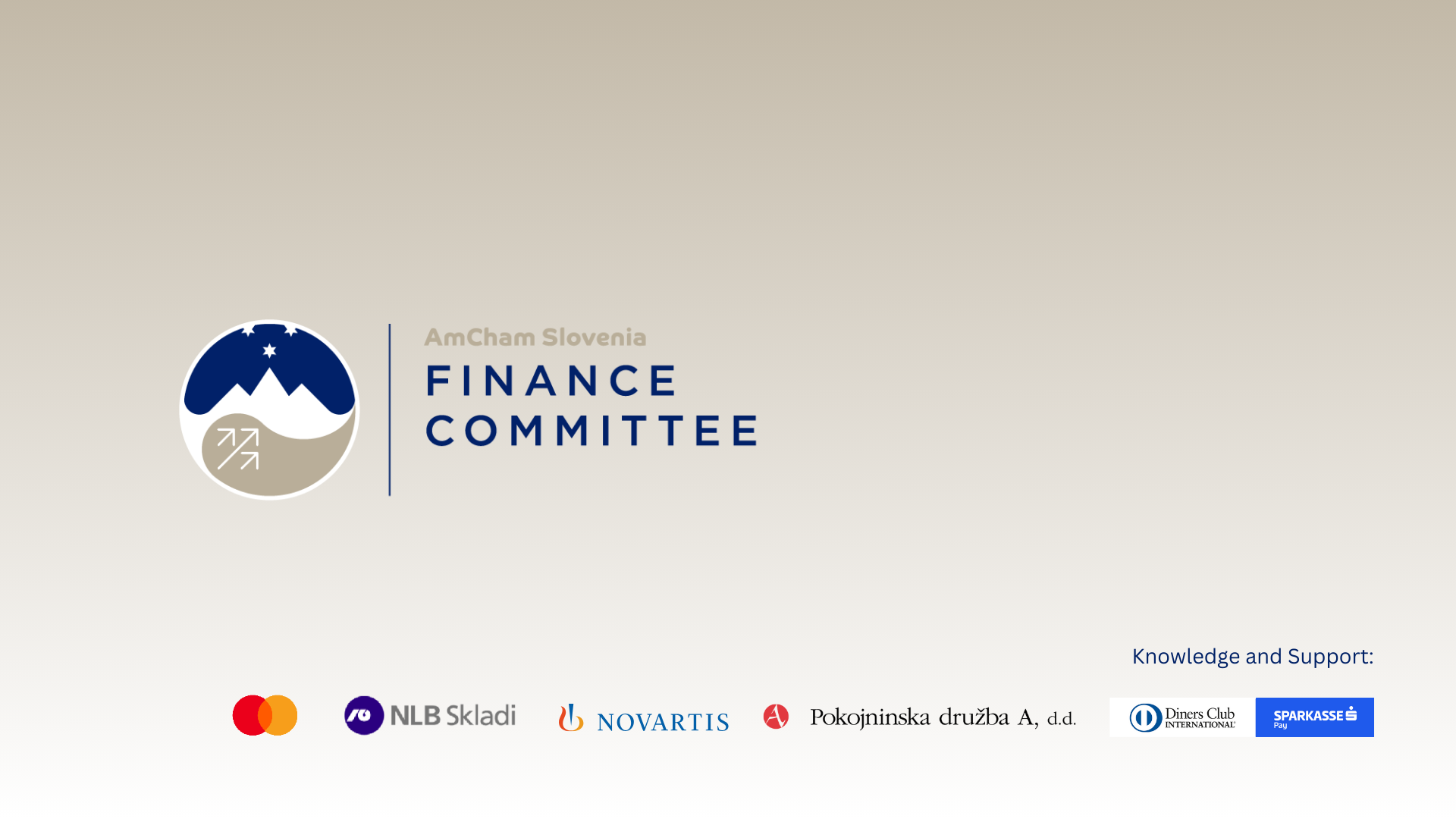The AmCham Finance Committee is committed to a predictable and competitive business environment in which companies have the opportunity to develop and grow and in which the tax and financial environment encourages rather than hinders them.

Key areas of the Committee’s work
Tax Policy in Slovenia Should Be Predictable and Reasonable and Not Interfere With Constitutional Rights
Slovenia’s new Personal Income Tax Act (ZDoh-2AA) entered into force in January 2023. Among other things, the new Act introduces a lower general level of tax incentives, abolishes the linking of tax incentives to inflation (which, as a result of high inflation, actually means lower net salaries for everyone), increases the taxation of highly qualified professionals, makes internal ownership of businesses more difficult, and significantly worsens the social position of farmers in less-favored areas.
Since we wish to see fair taxation in Slovenia and a tax system that does not change from year to year, AmCham Slovenia, as one of the 15 business and agricultural organizations that make up the so-called Economic Circle, supports the National Council’s call for a review of the new Act by the Constitutional Court.
A Development Cap for a Development-Oriented Slovenia
The business sector and the Finance Committee have been calling for the introduction of a development cap on pension and health insurance contributions for years. This is an urgently necessary investment for Slovenia if we wish to become (and remain) a country where our businesses can develop top-level products and services and enable young people to stay in Slovenia and be productive in high added-value jobs.
We propose a development cap of two times the average gross salary since this would cover the key professions that drive development, including engineers, scientists, developers, and professors. This also includes professions such as managers and doctors, who have invested heavily in their own skills and development and are particularly internationally mobile.
A development cap also signals to foreign professionals that Slovenia’s tax environment is competitive as we are “competing” for talent with comparable countries.
Measures to Make Our Tax Environment More Stimulating for Investment
We propose maintaining tax incentives for R&D investment, maintaining 40% tax relief on investments, and reducing the taxation of dividends, which would attract investment in capital assets.
The Second Pension Pillar and the Development of the Capital Market
Increasing existing tax incentives for the development of the second pension pillar will enhance the attractiveness of saving and the volume of savings in the second pillar. These savings are reinvested into the economy and significantly contribute to the development of the capital market while also providing savers with a decent pension.
The development of the second pension pillar, which in Slovenia consists of voluntary supplementary pension insurance and has been in place since 2001, and which today covers around 60% of all employees, is essential for the sustainability and stability of the system. Not only will the second pillar provide higher pensions to individuals upon retirement but it will also increase the volume of savings that are reinvested in the economy and contribute significantly to the development of Slovenia’s capital market. This increases access to capital for domestic businesses, which will reduce their borrowing costs and boost their competitiveness, which in turn can lead to growth and job creation.
Pension System Sustainability and Increasing Productivity
Pension-related expenditure in Slovenia already accounts for 10% of GDP today and is projected by the OECD to reach 15.7% by 2050. Given the growing number of pensioners, it is, therefore, unrealistic to expect the state to provide additional resources capable of maintaining pension levels at their current level in the future, let alone ensure their increase. Over the coming decades, public pensions will decline towards 40% of an individual’s pre-retirement net pay.
GDP growth in Slovenia is mainly based on an increase in the quantity of labor, while real productivity growth remains modest. With demographic trends predicting an ageing population, more will have to be done to raise productivity. We must, therefore, strive to raise productivity to the level of the leading innovators of the European Union. “Over the last decade, the population in the 20–64 age group has declined by 67,000, and projections based on moderate net migration show that it will decline by a further 43,000 by 2030 and by 119,000 by 2050, compared to 2022.”
The answer to the question of how to increase productivity lies, in part, in the use of generative artificial intelligence, which “can be used for areas such as expression, reasoning and communication, coordination, and working with ideas or design.”2
Long-Term Care Should Not Be Just Another Burden Solely Placed on Employers
Under the new Long-Term Care Act, 1% of the gross salary is contributed by the employee and 1% by the employer, while the individual contributes 1% of their calculated gross pension. We warn that, with the introduction of the new contribution, the tax burden on labor in Slovenia is increasing once again, rising disproportionately just above the average salary and ranking among the highest in the European Union. Additional tax burdens on labor are, therefore, unacceptable. Reserves should first be found through rationalization of the healthcare and long-term care systems. It should be remembered that increased tax burdens on labor are accompanied by the growth of the informal economy and a search for ways to bypass the system, where the final tax take can even be lower than before the new burdens were introduced.
Digital Payments
The level of the informal economy in Slovenia is relatively high. Cash, the use of which was enshrined in the Constitution at the end of last year, is still the prevailing means of payment, while infrastructure for the acceptance of electronic payments is still relatively undeveloped. People should have the opportunity to choose their payment method, including digital payment, since both local and foreign consumers expect to have a choice of different payment instruments and the option of electronic payment. A comprehensive program for the development of payment infrastructure must, therefore, be implemented to promote the acceptance of card payments in Slovenia, present new technologies on the market, and introduce advantageous and smart solutions.
Two key methods exist by which the government can play a part in improving the electronic payment infrastructure in Slovenia:
-
by encouraging cashless payment;
-
by making it mandatory to accept cashless payments.
Excise Duties
The Finance Committee draws attention to the importance of proportionate excise duties that take into account the consequences of increasing these duties, namely a fall in sales, business closures, and job losses, which would directly negatively impact the state’s revenue from contributions, income tax, and other business taxes.
Increases in excise duties lead consumers to buy products in neighboring countries, where they are cheaper, resulting in the growth of the informal economy. At the same time, raising excise duties does not lead to better health of the population or a reduction in healthcare costs. Instead, it encourages the purchase of low-cost products of questionable quality.
Regarding the increase in customs duties, we once again draw attention to the predictability of Slovenia’s tax and business environment, which is of key importance to the economy.

In the event of exceptional circumstances like a pandemic, we want the state to help companies as quickly and with as little bureaucracy as possible, to continue operating and retain as many jobs as possible, while keeping the solvency needed to emerge from the crisis.

Who are the members of the Committee?
See the full list of Committee members.
Join the AmCham Finance Committee
For all questions related to the Committee’s work you can turn to our Committee coordinator Vida Dolenc Pogačnik, our COO and International Cooperation Director.

Vida Dolenc Pogačnik
COO and International Cooperation Director

